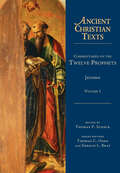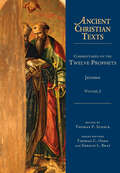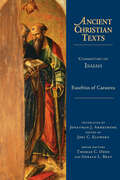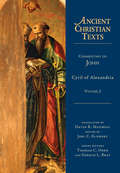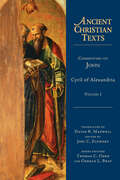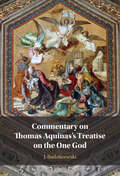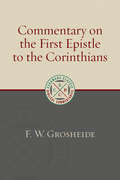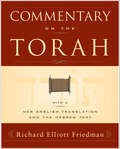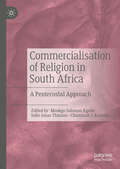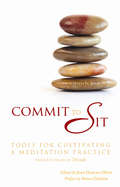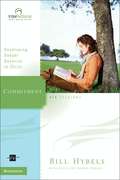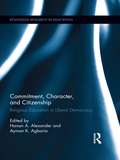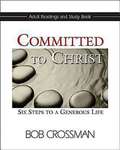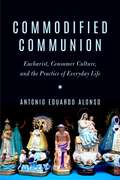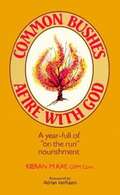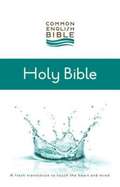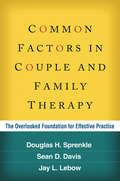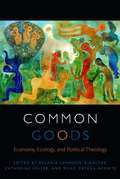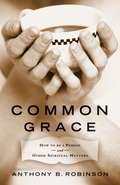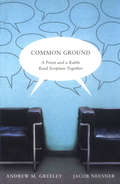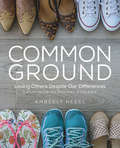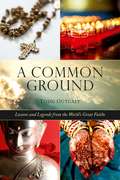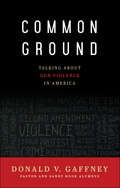- Table View
- List View
Commentaries on the Twelve Prophets: Volume 2 (Ancient Christian Texts #1)
by Jerome Thomas C. ScheckJerome (c. 347-419/20), one of the West's four doctors of the church, was recognized early on as one of the church's foremost translators, commentators and advocates of Christian asceticism. Skilled in Hebrew and Greek in addition to his native Latin, he was thoroughly familiar with Jewish traditions and brought them to bear on his understanding of the Old Testament. Beginning in 379, Jerome used his considerable linguistic skills to translate Origen's commentaries and, eventually, to translate and comment on Scripture himself. In 392, while preparing his Latin Vulgate translation of the Bible, Jerome wrote his commentary on Nahum, the first in a series of commentaries on five of the twelve minor prophets. Micah, Zephaniah, Haggai and Habakkuk soon followed. He was interrupted in 393 by the Origenist controversy, after which he became a vocal critic of Origen of Alexandria—a controversy he referred to in his commentaries on Jonah and Obadiah in 396. This Ancient Christian Texts volume, edited and translated by Thomas Scheck in collaboration with classics students from Ave Maria University, includes these seven commentaries. The second volume contains Jerome's commentaries on Zechariah, Malachi, Hosea, Joel and Amos, all of which were written in 406, completing the group of twelve prophets. Throughout these commentaries Jerome displays his familiarity with both Hebrew and Greek texts. His spiritual exegesis relies heavily on the exegetical work of Origen. Jerome looks beyond the nationalistic sentiments of the prophets to see a wider message about God's mercy and justice. His commitment to the truthfulness of the Scriptures as the Word of God is exemplified by his defense of the historicity of Jonah. He finds the fundamental message of the prophets to be the intent to console the saints, so that they may disdain the things of this world and prepare themselves for the day of judgment.
Commentaries on the Twelve Prophets: Volume 2 (Ancient Christian Texts #2)
by Jerome Thomas P. ScheckJerome (c. 347–419/20), one of the West's four doctors of the church, was recognized early on as one of the church's foremost translators, commentators, and advocates of Christian asceticism. Skilled in Hebrew and Greek in addition to his native Latin, he was thoroughly familiar with Jewish traditions and brought them to bear on his understanding of the Old Testament. Beginning in 379, Jerome used his considerable linguistic skills to translate Origen's commentaries and, eventually, to translate and comment on Scripture himself. Jerome began writing commentaries on the twelve minor prophets in 392 while preparing his Latin Vulgate translation of the Bible. After completing Nahum, Micah, Zephaniah, Haggai, and Habakkuk, he was interrupted in 393 by the Origenist controversy, after which he became a vocal critic of Origen of Alexandria. He finished his commentaries on Jonah and Obadiah in 396. These seven commentaries are available in volume one. The Origenist controversy and his commentary on Matthew occupied his time for the next several years. He finally completed the rest of the twelve prophets in 406. This Ancient Christian Text volume, edited and translated by Thomas Scheck in collaboration with classics students from Ave Maria University, includes those final five commentaries on Zechariah, Malachi, Hosea, Joel, and Amos. Throughout these commentaries Jerome refers frequently to the work of previous commentators, and his spiritual exegesis relies heavily on the exegetical work of Origen—though he acknowledges that "I have not followed them in everything." Jerome hears in these texts God's judgment and mercy not only on Israel but especially on the Christian community. In Amos, for example, he says that "whatever we have said about Judah refers to the church." He wrestles especially with the scandalous message of Hosea, which he refers to as drowning with Pharaoh during the crossing of the Red Sea. But he trusts that "the ways of the Lord are the reading of the Old and New Testament, the understanding of the holy Scriptures." Jerome's magisterial commentaries help us walk more faithfully in God's ways.
Commentary on Isaiah (Ancient Christian Texts)
by Eusebius of CaesareaPreachingEcclesiastical HistoryOnomasticonPreparation forDemonstration of the GospelCommentary on Isaiahanologia fideiHere, for the first time in English, Jonathan Armstrong provides readers with a highly serviceable translation of Eusebius's notably difficult Greek text, along with a helpful introduction and notes.Ancient Christian Texts are new English translations of full-length commentaries or sermon series from ancient Christian authors that allow you to study key writings of the early church fathers in a fresh way.
Commentary on John (Ancient Christian Texts #Volume 2)
by Cyril of AlexandriaCyril of Alexandria (ca. 378-444), one of the most brilliant representatives of the Alexandrian theological tradition, is best known for championing the term Theotokos (God-bearer) in opposition to Nestorius of Constantinople. Cyril's great Commentary on John, offered here in the Ancient Christian Texts series in two volumes, predates the Nestorian controversy and focuses its theological firepower against Arianism. The commentary, addressed to catechists, displays Cyril's breathtaking mastery of the full content of the Bible and his painstaking attention to detail as he offers practical teaching for the faithful on the cosmic story of God's salvation. David R. Maxwell provides readers with the first completely fresh English translation of the text since the nineteenth century. It rests on Pusey's critical edition of the Greek text and displays Cyril's profound theological interpretation of Scripture and his appeal to the patristic tradition that preceded him. Today's readers will find the commentary an indispensable tool for understanding Cyril's approach to Scripture.
Commentary on John: Volume 1 (Ancient Christian Texts #Volume 1)
by Cyril of AlexandriaCyril of Alexandria (ca. 378-444), one of the most brilliant representatives of the Alexandrian theological tradition, is best known for championing the term Theotokos (mother of God) in opposition to Nestorius of Constantinople. Cyril's great Commentary on John, offered here in the Ancient Christian Text series in two volumes, predates the Nestorian controversy, however, and focuses its theological fire power against Arianism. The commentary, which is addressed to catechists, displays Cyril's breath-taking mastery of the full content of the Bible and his painstaking attention to detail as he seeks to offer practical teaching on the cosmic story of God's salvation. David Maxwell provides readers with the first complete English translation of the text since the nineteenth century. It rests on Pusey's critical edition of the Greek text and puts on display Cyril's theological interpretation of Scripture and his appeal to the patristic tradition that preceded him. Today's readers will find the commentary an indispensable tool for understanding Cyril's approach to Scripture.
Commentary on Thomas Aquinas's Treatise on the One God
by J. BudziszewskiThomas Aquinas's classic Treatise on the One God is one of the greatest works ever written in the history of philosophy and theology. During the first half of the twentieth century, philosophy of religion was widely viewed as dead, not even a domain of serious questions but only of 'pseudo-questions.' Surprisingly, not only did the supposed corpse rise from the dead, but religion once again became one of the most active fields of philosophical investigation. The time could not be more fitting for a reinvestigation of Treatise on the One God, which opens the massive Summa theologiae. In this unparalleled exploration of the Treatise's penetrating arguments J. Budziszewski explores and illuminates the text with a luminous line-by-line commentary. Supplemented with thematic discussions, this book discusses not only the Treatise itself, but also its immediate relevance to contemporary thought and issues of the modern world. This work fittingly closes the author's series of commentaries on the Summa Theologiae.
Commentary on the First Epistle to the Corinthians (Eerdmans Classic Biblical Commentaries)
by F.W. GrosheideNew in the Eerdmans Classic Biblical Commentaries collectionThis classic commentary by F. W. Grosheide on 1 Corinthians unpacks Paul’s letter to the first-century Corinthian church and applies his teachings to our own situation with vigor and understanding. The volume throughout exhibits Grosheide’s fairness to the views of others and his single-mindedness to expound fully the inspired text.Originally published in 1953 as part of the New International Commentary on the New Testament series, Grosheide’s Commentary on the First Epistle to the Corinthians in this new format will continue helping pastors, teachers, students, and other Bible readers grasp the aim and major themes of Paul’s first Corinthian letter.
Commentary on the First Epistle to the Corinthians (Eerdmans Classic Biblical Commentaries)
by F.W. GrosheideNew in the Eerdmans Classic Biblical Commentaries collectionThis classic commentary by F. W. Grosheide on 1 Corinthians unpacks Paul&’s letter to the first-century Corinthian church and applies his teachings to our own situation with vigor and understanding. The volume throughout exhibits Grosheide&’s fairness to the views of others and his single-mindedness to expound fully the inspired text.Originally published in 1953 as part of the New International Commentary on the New Testament series, Grosheide&’s Commentary on the First Epistle to the Corinthians in this new format will continue helping pastors, teachers, students, and other Bible readers grasp the aim and major themes of Paul&’s first Corinthian letter.
Commentary on the Torah
by Richard Elliott FriedmanIn this groundbreaking and insightful new commentary, one of the world's leading biblical scholars unveils the unity and continuity of the Torah for the modern reader. Richard Elliott Friedman, the bestselling author of Who Wrote the Bible?, integrates the most recent discoveries in biblical archaeology and research with the fruits of years of experience studying and teaching the Bible to illuminate the straightforward meaning of the text -- "to shed new light on the Torah and, more important, to open windows through which it sheds its light on us."While other commentaries are generally collections of comments by a number of scholars, this is a unified commentary on the Torah by a single scholar, the most unified by a Jewish scholar in centuries. It includes the original Hebrew text, a new translation, and an authoritative, accessibly written interpretation and analysis of each passage that remains focused on the meaning of the Torah as a whole, showing how its separate books are united into one cohesive, all-encompassing sacred literary masterpiece. This landmark work is destined to take its place as a classic in the libraries of lay readers and scholars alike, as we seek to understand the significance of the scriptural texts for our lives today, and for years to come.
Commercialisation of Religion in South Africa: A Pentecostal Approach
by Chammah J. Kaunda Mookgo Solomon Kgatle Jonas Sello ThinaneAspects of the 2017 Final Report of the South African Commission on the Promotion and Protection of the Rights of Cultural, Religious and Linguistic Communities (CRL) have drawn strong criticism, particularly from South African scholars, politicians and the public. The criticism is largely regarding the constitutionality of its recommendation, which calls for regulation of the Religion to combat its abuse and commercialization. Scholars have criticized the CRL Rights Commission for hastening its investigation and releasing the final report without having a substantive understanding of what is meant by the commercialization of religion, and consequently the unconstitutional implications of the recommendation, to regulate religion. A close reading of this critique has pointed to the urgent need to assemble a cumulative body of research that examines and advances understanding of what is meant by the commercialization of religion. Accordingly, this book gathers scholarly contributions which offer valuable insights into the basics of what is meant by the commercialization of religion. Contributors examine this phenomenon from the historical roots to the manifestation in the contemporary world, particularly in South Africa.
Commit to Sit: Tools For Cultivating A Meditation Practice From The Pages Of Tricycle
by Joan Duncan OliverFrom the pages of Tricycle, the country’s most widely read Buddhist magazine, comes Commit to Sit, an introduction to the art of meditation. In recent years, interest in meditation has grown to include not only those on a spiritual search, but also those who are simply working toward a healthy and meaningful life. <P><P>This book brings together a broad range of Buddhist meditative techniques that have appeared in the magazine over the years. Contributors include some of the foremost voices in contemporary Buddhism: Pema Chödrön starts our journey with an inspirational Foreword. <P><P>Lama Surya Das explores the definition of meditation, while Sharon Salzberg and Joseph Goldstein lay out a 28-day program for establishinga daily practice. Wherever you are on your search, you will find plenty of guidance in this book. Learn about insight meditation from Bhante Henepola Gunaratana and Sylvia Boorstein. Or about zazen from Barry Magid and Martine Batchelor. Gil Fronsdal offers instruction in metta (lovingkindness) meditation, while Judith Simmer-Brown teaches tonglen, a Tibetan Buddhist practice for cultivating compassion. We also learn about the crucial role the body plays in meditation from S. N. Goenka, Reginald Ray, Wes Nisker, and Cyndi Lee. <P><P>We receive guidance on managing issues that arise in meditation from Jon Kabat-Zinn, Christina Feldman, Matthieu Ricard, Pat Enkyo O’Hara, and others. And there are practices for bringing mindfulness and compassion to daily life from Thubten Chodron, Sayadaw U Tejaniya, and Michael Carroll. Though targeted to the reader who would like to begin meditating, this collection also offers support and guidance to the experienced meditator working to sustain a lifelong practice. This is a guide to meditative practice for any seeker wishing to deepen their understanding of themselves and their world.
Commitment
by Bill Hybels Kevin HarneyWhat does it mean to be truly committed to Christ? Jesus’ answer to that question forms perhaps the greatest sermon ever delivered. In Commitment, you’ll revisit the Sermon on the Mount to discover practical ways for assessing your present level of commitment and setting goals for its growth. You’ll find out what the Master expects from those who follow Him and what rewards await them. You’ll also learn how to sidestep common barriers to commitment and draw closer to Christ than you’ve ever thought possible. As you explore the themes of Jesus’ famous sermon and apply them to your own relationship with God, you’ll discover the confidence that comes from being fully committed to Christ. Interactions—a powerful and challenging tool for building deep relationships between you and your group members, and you and God. Interactions is far more than another group Bible study. It's a cutting-edge series designed to help small group participants develop into fully devoted followers of Christ.
Commitment, Character, and Citizenship: Religious Education in Liberal Democracy (Routledge Research in Education)
by Hanan A. Alexander Ayman K. AgbariaAs liberal democracies include increasingly diverse and multifaceted populations, the longstanding debate about the role of the state in religious education and the place of religion in public life seems imperative now more than ever. The maintenance of religious schools and the planning of religious education curricula raise a profound challenge. Too much state supervision can be conceived as interference in religious freedom and as a confinement of the right to cultural liberty. Too little supervision can be seen as neglecting the development of the liberal values required to live and work in a democratic society and as abandoning those who within their communities wish to attain a more rigorous education for citizenship and democracy. This book draws together leading educationalists, philosophers, theologians, and social scientists to explore issues, problems, and tensions concerning religious education in a variety of international settings. The contributors explore the possibilities and limitations of religious education in preparing citizens in multicultural and multi-religious democratic societies.
Committed to Christ: Six Steps to a Generous Life
by Bob CrossmanCommitted to Christ: Six Steps to a Generous Life is a six-week stewardship program that presents giving as a lifelong journey in Christian discipleship. This Adult Readings and Study Book is designed for use in the six-week small group study that undergirds the program, as well as by others participating in the program. After an introductory Sunday stressing the importance of commitment to Christ, the next six weeks are spent exploring six steps to a generous life: Prayer Bible Reading Worship Witness Financial Giving Service With each step, readers are asked to assess prayerfully their own level of commitment and to consider increasing that commitment by one step. Equal emphasis is placed on each of the six steps, clearly communicating that this program is not simply about money, but rather cultivating a thankful heart that will lead us to giving more than we can ever imagine. “For a program that focuses on the totality of stewardship, there is none better.” -Jim Polk, Senior Pastor, El Dorado First United Methodist Church, El Dorado AR
Commodified Communion: Eucharist, Consumer Culture, and the Practice of Everyday Life
by Antonio Eduardo AlonsoWINNER, 2021 HTI BOOK PRIZEResist! This exhortation animates a remarkable range of theological reflection on consumer culture in the United States. And for many theologians, the source and summit of Christian cultural resistance is the Eucharist. In Commodified Communion, Antonio Eduardo Alonso calls into question this dominant mode of theological reflection on contemporary consumerism. Reducing the work of theology to resistance and centering Christian hope in a Eucharist that might better support it, he argues, undermines our ability to talk about the activity of God within a consumer culture. By reframing the question in terms of God’s activity in and in spite of consumer culture, this book offers a lived theological account of consumer culture that recognizes not only its deceptions but also traces of truth in its broken promises and fallen hopes.
Common Bushes Afire With God
by Kieran M. KayA book of short, practical meditations sprinkled with short prayers.
Common English Bible: A Fresh Translation To Touch The Heart And Mind
by Common English BibleTake a fresh look at the Bible while you experience a new translation. The Common English Bible is relevant, readable, and reliable. The result is a new version that the typical reader or worshipper is able to understand. 115 leading biblical scholars from 22 faith traditions and 77 reading specialists in 13 denominations worked on this translation.
Common Factors in Couple and Family Therapy
by Sean Davis Douglas SprenkleGrounded in theory, research, and extensive clinical experience, this pragmatic book addresses critical questions of how change occurs in couple and family therapy and how to help clients achieve better results. The authors show that regardless of a clinician's orientation or favored techniques, there are particular therapist attributes, relationship variables, and other factors that make therapy specifically, therapy with couples and families effective. The book explains these common factors in depth and provides hands-on guidance for capitalizing on them in clinical practice and training. User-friendly features include numerous case examples and a reproducible common factors checklist.
Common Goods: Economy, Ecology, and Political Theology (Transdisciplinary Theological Colloquia)
by Melanie Johnson-DeBaufre, Catherine Keller, and Elias Ortega-AponteIn the face of globalized ecological and economic crises, how do religion, the postsecular, and political theology reconfigure political theory and practice? As the planet warms and the chasm widens between the 1 percent and the global 99, what thinking may yet energize new alliances between religious and irreligious constituencies?This book brings together political theorists, philosophers, theologians, and scholars of religion to open discursive and material spaces in which to shape a vibrant planetary commons. Attentive to the universalizing tendencies of “the common,” the contributors seek to reappropriate the term in response to the corporate logic that asserts itself as a universal solvent. In the resulting conversation, the common returns as an interlinked manifold, under the ethos of its multitudes and the ecology of its multiplicity.Beginning from what William Connolly calls the palpable “fragility of things,” Common Goods assembles a transdisciplinary political theology of the Earth. With a nuance missing from both atheist and orthodox religious approaches, the contributors engage in a multivocal conversation about sovereignty, capital, ecology, and civil society. The result is an unprecedented thematic assemblage of cosmopolitics and religious diversity; of utopian space and the time of insurrection; of Christian socialism, radical democracy, and disability theory; of quantum entanglement and planetarity; of theology fleshly and political.
Common Grace
by Anthony B. RobinsonIn the Christian world, there is Special Grace, which is knowledge of God through the life and teachings of Jesus Christ. On the other hand, Common Grace is what a person can know of God through everyday life--experiences with family and friends, observance of the natural world. This is a book about the spiritual and moral pathways that can inform one's everyday life. With the natural skills of a gifted preacher, Anthony Robinson connects stories and anecdotes to biblical wisdom and offers up valuable, useful, and inspiring lessons for life. Common Grace is divided in thirds: first he address the personal, the individual, the self. Next, he relies on the notion that a person is a person because of other people, and he moves to the next concentric circle of family and personal relationships. The third part of the book is about being a person in the world, interacting and contributing to the institutions and make up a society.
Common Ground
by Andrew GreeleyJudaism and Christianity meet in scripture, which they share and about which they contend. In Common Ground Father Andrew Greeley and Rabbi Jacob Neusner present their characteristically candid - and often provocative - interpretations of the history, context, and meaning of scripture. Written in alternating chapters, Common Ground reveals how a rabbi understands Christ, Mary, and St Paul, and how a priest views creation, Abraham and Sarah, and the prophets. Neusner calls upon the ancient Rabbinic approach to scripture - the conversational dialogue of "Midrash" - while Greeley creatively renews the narrative tradition of Christianity. Together they show that differences in responses to scripture enrich the possibilities of biblical renewal.
Common Ground - Women's Bible Study Guide with Leader Helps: Loving Others Despite Our Differences (Common Ground)
by Amberly NeeseLearn to live at peace with others even when you disagree by studying biblical stories of rivalries in Common Ground by Amberly Neese. Whether it is in politics, the professional world, a party, or a pew, we face conflict every day. As discussions get more heated and social media is deluged with opinion-spewing, hurt feelings, and broken relationships, we need hope and practical tools to navigate the tumultuous waters and live at peace with everyone.Fortunately, the Scriptures hold the key to living at peace despite our differences. In Common Ground, a four-week Bible study, Amberly Neese combines stories of sibling rivalries from the Bible with personal experience, humor, hope, and her love of God’s Word. Stories examined from the Old and New Testaments include:- Joseph and His Brothers: How to Combat Jealousy- Moses, Miriam, and Aaron: How to Work Together Despite Differences- Mary, Martha, and Lazarus: How to Appreciate the Contributions of Others- Rachel and Leah: Having Compassion for the Plight of OthersThese stories point us to peace and reconciliation in all our relationships, reassuring us that it is possible to find common ground with everyone—despite our differences. Women will find biblical and practical help for:- Facing conflict- Navigating broken relationships- Handling heated discussions (in person and on social media)- Living at peace despite differencesComponents for this four-week Bible study, each available separately, include a Study Guide with Leader Helps, and video sessions with four 20 to 25-minute segments (with closed captioning).
Common Ground: Lessons and Legends from the World?s Great Faiths
by Todd OutcaltAs the spice maker’s cabinet is full of many herbs, so should a scholar be full of Scripture, Talmud, and Legend--an ancient Jewish proverb This reference to legend--or the teaching tales used by the sages--is a remarkable testimony to the power of story and its place in the history, development, and culture of a people. Legends have helped people understand one another, and offer a context for utilizing ancient beliefs in new ways. A Common Ground is an eclectic volume of the greatest legends of the world including those from Buddhism, Christianity, Judaism, Islam, and more, along with a discussion on why these stories still matter today. The tales featured demonstrate how seemingly disparate beliefs share common ideas and concerns that are more similar than they are different, helping readers to see the world around them with a fresh perspective. These stories and parables attributed to saints and sages will offer inspiration for those who desire to live a life of generosity, understanding, and hope. As the book brings together the most marvelous teachings of the world’s great faiths, readers will discover new points of conversation and understanding. Likewise, this collection of stories from voices as diverse as Tolstoy and Lao Tzu, from Buddha to Jesus, create a beautiful tapestry of teaching that can be applied to contemporary problems and personal choices
Common Ground: Talking About Gun Violence in America
by Donald GaffneyEvery time a shooting makes national headlines, the same debates erupt: Is the problem guns or mental health? Why is the United States unique in its gun violence problem? Can we reduce this violence while protecting the right to bear arms? Newtown, Connecticut, native and Disciples of Christ minister Donald V. Gaffney brings a calm and compassionate voice to these complex questions, offering a guide for individuals and groups to reflect on and discuss guns and gun violence. Common Ground explores the place of guns in our individual and national histories, violence in Scripture, the legal issues surrounding gun rights, and ways in which we as moral, life-valuing people can bridge the divide to help solve the problem of gun violence in the United States. To move beyond the talking points and rhetoric dominating gun violence discussions, Gaffney concludes chapters with questions for reflection and discussion to encourage self-examination, exploration, and evaluation of potential solutions to gun violence.
